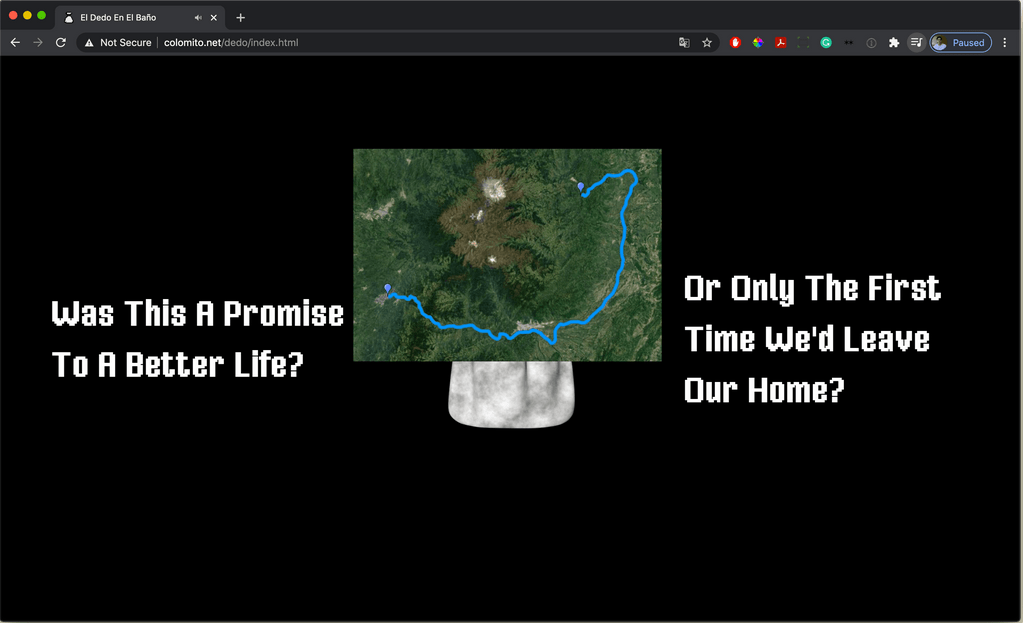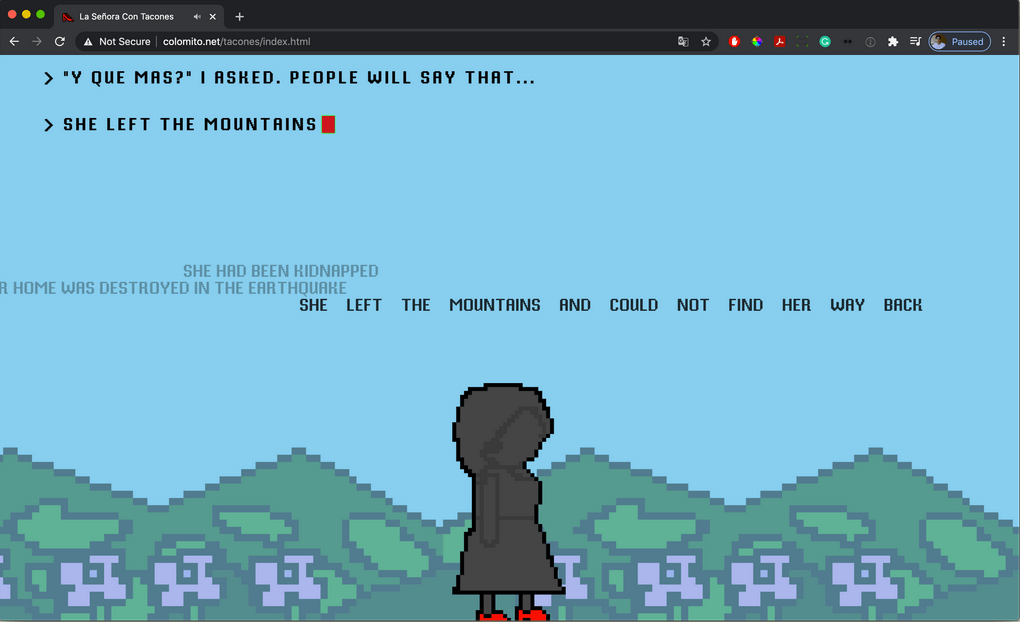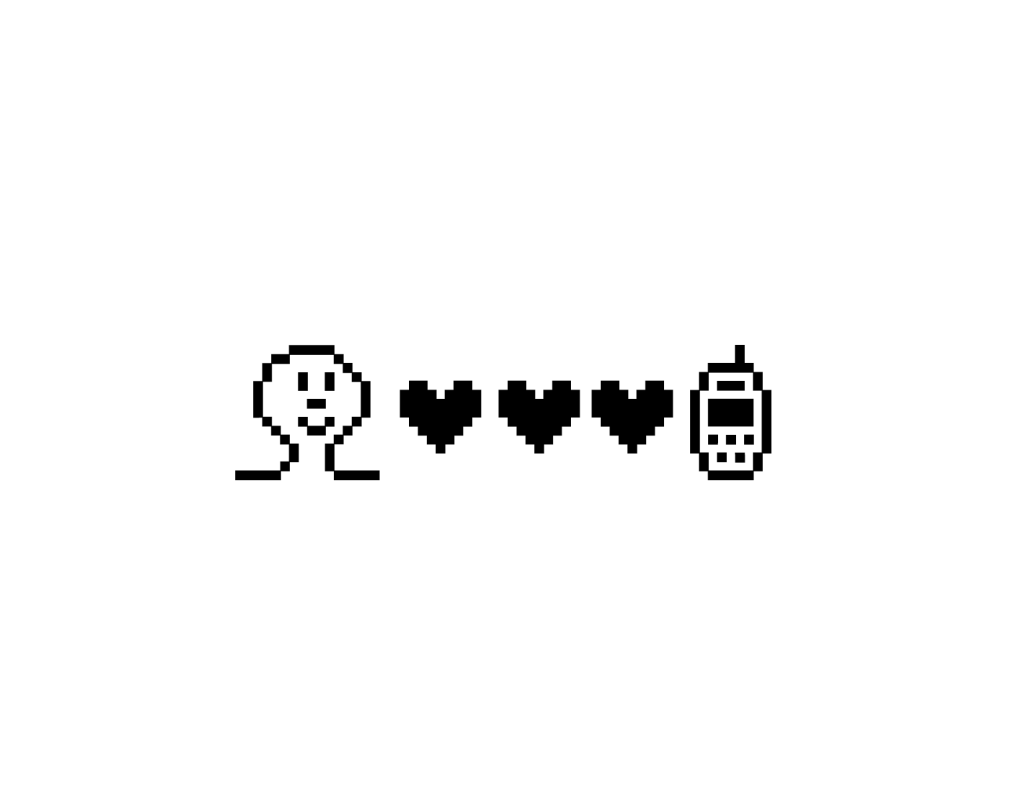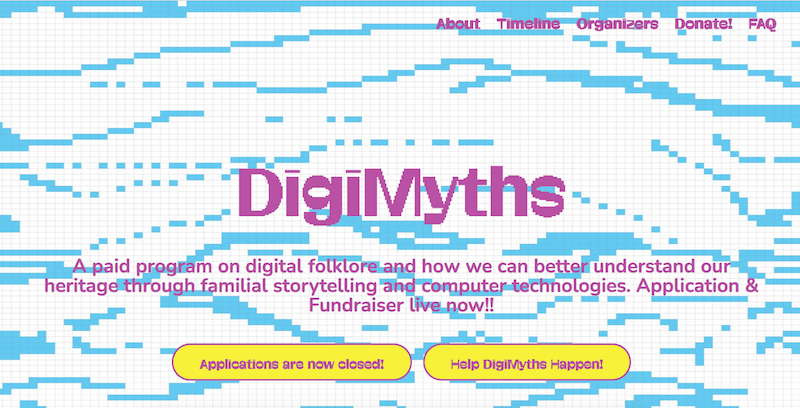Vast numbers of individuals and communities were already experiencing a sense of social, cultural and somatic disconnect prior to the necessity of physical distancing in light of the COVID-19 pandemic. The global public health crisis has made it even more clear that person to person connections are vital to our collective survival. We learn and empathize with one another through social engagement and collaboration. Many of these efforts and actions have been hindered due to the need to physically distance or quarantine as the global health crisis continues.
Having access to the internet and digital media applications has been invaluable for many of us in these increasingly isolating and stressful times. Connection to the World Wide Web and social media enables us to share important sociocultural issues and learn from one another on an international scale.
However, there are many individual and collective voices that remain marginalized and are even on the brink of extinction due to paternalistic policies, which uphold social, economic and ethnic inequality, inequity and injustice. These oppressive governing forces are the antithesis to the multicultural makeup of our contemporary societies. For too long, representations of the diverse world have been skewed and revised to reward and sustain a white male dominant perspective. Colonialism and white supremacy have had a devastating impact on geopolitical strife, public health, environmental crises, Internet access and freedom at large. Our social and cultural infrastructures (i.e. education, agriculture and housing) are fundamentally tied to these negative influences. One major transformative action that can reverse this detrimental trajectory, is decolonizing systemic frameworks and allying with marginalized communities through mutual aid efforts and asset mapping. The act of decolonization is when Indigenous and systemically oppressed peoples reclaim what a dominant group or structure has taken from them and exploited. It involves expressing their backgrounds, identities and experiences without the influence or revisionism of settler colonialism (see: Curiel-Allen, 2018 and Powys Whyte, 2018).
The internet is caught in a maelstrom of self determination and marginalization. Internet platforms are responsible for perpetuating colonial hegemony, but they can also be vital in the fight for liberation and preservation (see: Noble and Tynes, 2015). Artists, activists and educators are utilizing the World Wide Web in order to shift the paradigm and decolonize the virtual and physical realms.
Some of the invaluable online resources that are being developed to divert colonial narratives and hierarchies include digitized archives from revolutionary figures and events (see: Interference Archive); records and lexicons of Indigenous languages (see: Language Keepers Podcast) and various oral history databases. Another engaging initiative is DigiMyths. DigiMyths is a student-centered and experiential learning program, which seeks to bridge the geographical and cultural gap that third-culture kids often experience. According to DigiMyths, generations of individuals who “were raised in a culture other than that of their parents and family or their ethnic background, often have a deeply complex sense of who they are and where they belong; i.e. in a place that exists in concept only.” Furthermore, this conceptual setting is at risk of dissipating further, since connecting with family and visiting familial lands has been impacted by the current health pandemic and ongoing geopolitical crises and conflicts. Kevin Cadena is working on both the back-end and forefront of DigiMyths. As an educator and a programmer, Cadena’s focus is on accessibility and differentiated experiences that could benefit diverse communities of students and their families who have been disadvantaged by a lack of physical and virtual connectivity. The program is offered to college-aged students who are either enrolled in a degree program, recently graduated or who have taken a hiatus from their studies due to the hardships and stresses the pandemic has had on the education field at large.
Students enrolled in the program come from diverse cultural backgrounds and are seeking to reestablish or develop a deeper understanding of their lineage. Listening to primary accounts and relating information via storytelling is the crux of the students’ restorative engagement with their cultural heritage and ancestral land(s). Cadena’s own personal background and identity inform his contributions to the education and computer programming professions. Cadena was raised in Orlando, Florida and Queens, New York. Growing up, Kevin and his family resided in the neighborhoods of Millenia in Orlando and Jackson Heights in Queens; two places with richly heterogeneous demographic communities from the Caribbean, Latin America and Southern Asia.

Cadena’s work, which includes digital illustration, soundscapes, interactive websites, educational infographics and online video games, make connections to his familial roots and explores his position as a third-culture kid. Tigres De La Cumbia is inspired by an illustrative blanket that his family has had since the 1990s. Cadena acquired it when he moved back to New York as an adult. His re-presentation of the blanket connects his Colombian heritage with his interest and passion for video game culture. When you click on one of the 8-bit animated tigers, a chiptune Cumbia-style song plays.
Another of Cadena’s web-based projects, which symbolically explores his multicultural heritage, is an interactive storytelling game called Colo-Mitolo-Gital. The project was realized during his residency at Babycastles, a video game development collective and art space in New York City. Visitors to the online game are self-guided through two distinct chapters that feature unique cultural narratives presented via a combination of animation, digital graphics and bilingual text. The stories are derived from family narratives, which Cadena artfully reinterpreted while layering in elements of Colombian heritage and history. The project was a way for Cadena to understand his own cultural background. Here is a synopsis of each navigable tale:

El Dedo En El Baño (Grandmother) – For generations, there was a cloth bag in my great-great grandmother’s bathroom said to contain the finger bone of a family member who had passed away. When visiting the grave became impossible after my family was dislocated by the civil war, the bone was taken to maintain a spiritual link.

La Señora Con Tacones (Father) – A well-liked woman on my father’s street mysteriously went missing after a night out. She was never found, but the sound of her heels clacking could still be heard coming down the street every night as if she’s trying to make it back home.
I recently spoke to Kevin about where his interests in programming came from, how he and his colleagues are addressing intersectionality within the pedagogy of computer programming and how we all can and should acknowledge support the work of BIPOC (Black, Indigenous and People of Color) groups and individuals in computer science, digital art and education. Below are excerpts from our discussion.

What drew you to programming and digital media?
I was privileged enough to grow up with a piece of computer technology always in my house, because my family understood their importance and were able to stretch their income to afford it even if they weren’t proficient themselves. From my adolescence with a Nintendo64 to my teenage years sitting in front of a home computer, this constant exposure led me to understand digital media as a space for personal expression and creation. I am driven to create digital experiences for others by reflecting on how others have created websites and video games for me. The best of these experiences create an innate sense of joy from watching in real time how elements of these technologies react to one’s input in intuitive or natural ways. This is something I keep in the back of my mind as I work on a personal project.
Did you have any significant educational memories and mentors who inspired or transformed your passion for technology?
My family, like a lot of immigrant households, pushed the importance of education onto me and my sister heavily. They also tried to get involved in the public school system themselves with my dad becoming a school bus driver.
I think we can also relate to having one or two teachers throughout our educational journey who have a meaningful impact on us. In high school it was my graphic design professor, who through letting students work in his computer lab outside of class hours, allowed us access to expensive resources we didn’t have at home. Being able to use things like the Adobe Suite, a lighting studio, cameras, a screen printing setup and darkrooms changed my career path entirely.
Another professor would be Chris Novello who taught a class called Computer Utopias at RISD. Chris and his class were seminal in laying the foundation of what would be my relationship to technology moving forward. He drove us to pick apart how technology from the viewpoint of ethics, representation and accessibility and left us with the message that “technology must have a deep understanding of culture in order for it to be significant.”
I was also part of a group of students in college eager to learn to code at a time when the department wasn’t offering anything for that. Through each other, we picked up a lot of tricks and it showed me how vital learning within a community can be. I wouldn’t be as good of a programmer now without that support system of peers all those years back.

Can you tell me about DigiMyths? What is its mission, who is its intended audience(s), how can we get involved?
DigiMyths is a paid alternative educational program on digital folklore and how we can better understand our own heritage through familial storytelling, computer technologies and network culture. So much of how we connect with our history and heritage is through visiting the land or speaking the language, which at this point has become difficult because of COVID-19. The program grew out of a desire to support and help participants explore their familial lands by contextualizing customs, stories and expanding understanding with computer technology and without geo-physicality. Some of the questions the program asked through its programming are:
- Who or what has informed our relationship to our ancestry and how can it be channeled through digital means?
- What do computer technologies and network culture offer as a medium for exploration of our own heritage?
- How can we connect with our histories through mediums and spaces that matter to us?
- Why is so much of our understanding of our respective cultures tied to geo-physicality?
During the fall of 2020, I took part in conversations hosted by Artist Literacies Institute with other educators looking to establish alternative educational programs that could support students at a time when colleges are throwing them under the bus to keep the institution afloat (i.e kicking them off campus, not refunding money and not reducing tuition). A lot of questions were being asked around compensating students for their time, flexibility in curriculum and strong documentation practices. This was happening while I was doing a residency at Babycastles, working on using computer technology to connect with my ancestry and family in the age of COVID-19. What came out of this residency was Colo-Mitolo-Gital. As part of the residency we were asked to create a public program that would be hosted through the Babycastles Academy. The confluence of the residency and these talks is how DigiMyths was born. It is also why this iteration was intended for students who were enrolled in a degree-granting arts program, graduated recently or had to stop their studies due to COVID-19 complications.
Does DigiMyths connect or relate to oral history initiatives that have been taking place in order to preserve and expand Indigenous cultures that are at risk of being assimilated and vanishing completely?
There are hints of oral history within the class because of the nature of its subject matter, but due to DigiMyths’ rapid development, it wasn’t as intentionally considered as it could be in future iterations. The program resonated with those looking to connect through oral history, because a lot of the participant’s projects had an oral history component to them. Often it was the kind of thing that involved the participants speaking with family elders to see what kinds of cultural knowledge these experienced members could pass on.
When it comes to the idea of preserving and expanding Indigenous cultures, I am fully in support of projects that do that, but I don’t think it is my place to make that the mission of DigiMyths as long as it exists as a project I maintain on my own as it would reek of white savior-ism. However, I’m happy to highlight the work of organizations like Rimay Raiz, which is a NY-NJ-based Andean diaspora grassroots collective that seeks to challenge Western epistemology by archiving, sharing & weaving the stories of our Andean diaspora communities across generations and borders. Being people from those indigenous communities, I feel they are the ones who should be at the forefront of what your question posits.

I see DigiMyths as being an integral platform for student-centered and problem-posing education, where the individual explores their own unique identities and heritage, teaches others about it via digital storytelling and then forms connections and deeper understandings of other cultures by interacting and listening to the experiences and stories of their peers.
Right now, my biggest questions for DigiMyths are how to make it sustainable. These alternative educational initiatives hold a lot of potential and the challenge they eventually run into is that organizing and teaching them is a monumental undertaking, especially for one person, which is the case with DigiMyths. I really loved how DigiMyths came together and that it expanded to be something that included the support of so many people from guest facilitators to speakers to jurors to the IndieGogo donors. Even with all that support, there were still other areas that still could’ve used another person or two long-term (i.e coordination and administrative tasks).
There is also the question of if everything breaks right and DigiMyths can expand, should a project like this still be managed by me alone? My answer is no. The real challenge is at what point do I and can I bring others on?
For me, all this points to the need to move from the idea of a singular person being a main point of knowledge. Throughout history, that form of didactic teaching has placed too much power and strain on one individual. How can we make peer-to-peer and communal forms of learning the standard, especially when capitalist modes of living have fragmented and compartmentalized our lives?
Below are links to resources related to topics discussed in this post:
Teaching and learning in the era of COVID-19
Collaborative learning methods and inspiration
Digital equity for educational environments
- Digital equity strategies for K-12 classrooms
- EdTech’s Digital Workspace resources for equitably incorporating technology in K-12 school settings
Indigenous, BIPOC and multicultural educational resources
- National Indian Education Association’s pedagogical resources and repositories for cultural preservation
- Language Keepers Podcast
- The Indigenous Digital Archive
- Primary sources for Latin American and Caribbean history
References, Notes, Suggested Reading:
Curiel-Allen, Tina. “What decolonization is, and what it means to me.” Teen Vogue, 3 March 2018. https://www.teenvogue.com/story/what-decolonization-is-and-what-it-means-to-me
Noble, Safiya Umoja, and Tynes, Brendesha M. (Eds.) (2015). The Intersectional Internet: Race, Sex, Class and Culture Online. Peter Lang Publishing, Inc.
Powys Whyte, Kyle. “White Allies, Let’s Be Honest About Decolonization.” Yes! 3 April 2018. https://www.yesmagazine.org/issue/decolonize/2018/04/03/white-allies-lets-be-honest-about-decolonization
